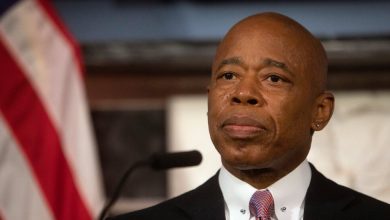Larry Woiwode, Who Wrote of Family, Faith and Rural Life, Dies at 80

Larry Woiwode, the author of lyrical, expansive novels, short stories, poems and essays, mostly planted in the American West, that explored the power of place, family ties and faith, spiritual and otherwise, died on April 28 in Bismarck, N.D. He was 80.
His son, Joseph, confirmed the death, in a hospital, but did not specify a cause.
Mr. Woiwode’s 1975 novel, “Beyond the Bedroom Wall,” a 600-page saga about four generations of a North Dakota farming clan, established his place in American letters. For its epic sweep, elegant language and essential themes, he was compared to Dickens, Melville and Tolstoy.
The novelist John Gardner, writing in The New York Times, called it a “brilliant solution” to the aesthetic problems raised by the modernist authors who were then upending traditional structure and their aversion to “plain, grown-up talk about love and death.”
“It seems to me,” Mr. Gardner added, “that nothing more moving has been written in years.”
In 1982, Jonathan Yardley of The Washington Post called “Beyond the Bedroom Wall” one of the 20 best books of the 20th century. Among the other names on his list were Ralph Ellison’s “Invisible Man” and F. Scott Fitzgerald’s “The Great Gatsby.”
It had taken Mr. Woiwode (pronounced WHY-woody) more than five years to write the book — though his wife, Carole Woiwode, said it felt like 10 — and the effort nearly broke him. It undid their marriage for a time, along with their finances and his health. Authors who should have known better mocked him for the delay.
“Larry Woiwode’s next, ‘Beyond the Bedroom Wall,’ has actually squatted down in sight of the promised land and refuses to budge,” Wilfred Sheed wrote acidly in The Times in 1974, adding, “No Farrar, Straus & Giroux catalog would be complete without its impending announcement.”
For a decade, he had been teetering on the edge of literary stardom. His mentor was William Maxwell, the gentle New Yorker fiction editor who had nurtured John Cheever, J.D. Salinger, Shirley Hazzard and John Updike — the literary lions of postwar America — and who, like Mr. Woiwode, had grown up in a small town in Illinois and had been educated at the state university’s Urbana-Champaign campus.
Mr. Maxwell was Mr. Woiwode’s lodestar and protector when at 24 he moved to New York, where he lived on beer and candy bars in a room on St. Marks Place in the East Village that rented for $9 a week, and on the sandwiches Mr. Maxwell would bring to the lunches they shared on benches in Central Park.
His first novel, “What I’m Going to Do, I Think,” was a meditation on love — the story of a young couple’s moral and emotional quest, set in a lodge on a Michigan lake where they have gone for their honeymoon.
When the book was bought by Farrar, Straus & Giroux, he was delighted by the venerable publishing house’s essential grubbiness, its cubicles “packed like a milliner going out of business,” he wrote in his memoir “What I Think I Did” (2000), just like the offices of his beloved, equally grubby New Yorker.(A second memoir, “A Step from Death” came out in 2008.)
Published in 1969, “What I’m Going to Do, I Think” won the William Faulkner Foundation Award for the most notable first novel of the year and was a finalist for the National Book Award.
With his career launched, the Woiwodes moved to an apartment on Willow Street in Brooklyn Heights. Truman Capote was down the block, Norman Mailer around the corner. Robert De Niro was a drinking buddy; his father, Robert De Niro Sr., an artist, painted Ms. Woiwode’s portrait.
In the halls of The New Yorker, Mr. Woiwode had a typically awkward moment with William Shawn, the magazine’s shyly dictatorial editor, who ducked and mumbled a bit before gently shaking his hand and pronouncing his about-to-be-published work there “a wonderful story.”
But despite the collisions with all those lions, and the sheen of the rubbed-off glitter that living among them might continue to bring to a young writer, New York was not the place for the Woiwodes. In 1978, they bought a 160-acre farm 12 miles from the nearest tiny town in North Dakota.
They farmed it themselves, raising wheat, barley, flax and other small grain crops; they also raised hay and quarter horses. Their four children were mostly home-schooled, by Ms. Woiwode, who had a facility for language and had once planned on a diplomatic career. Mr. Woiwode wrote in an old wooden granary.
Farming is a high-risk life. Mr. Woiwode was 63 when his jacket was caught in the draft shaft of a hay baler, breaking three ribs, compressing his spine and nearly severing his right arm. As a teenager, his son, Joseph, was trampled by a horse and spent days in a coma; when he recovered, motor skills still shaky, he nearly lost his fingers to a mower.
Setting fire to the weeds jamming a tractor one day, Mr. Woiwode nearly immolated himself and Joseph, then a toddler strapped to the seat with a cowboy belt. During a cataclysmic blizzard one winter, it was so cold for so long that Mr. Woiwode had to fuel his balky wood-burning furnace with the dead chickens that had frozen in their coop.
But the place also nurtured the family, and Mr. Woiwode’s work.
“There’s a stagy thump that the virgin soil has here over unshaded ground, so unlike cultivated land,” he wrote, “and in the surrounding painter’s colors, in light undimmed by pollution, you can suffer the sensation of being on a sound stage. For a second you see the entire panorama as being constructed to contain you in its scene.”
The Woiwodes practiced the Presbyterian faith they had turned to when their marriage was rocky, and Mr. Woiwode, who had been raised Roman Catholic, wrote often of his chosen faith and the land and the biblical stories that sustained and shaped it. This made him an anomaly in literary circles, as well as at the liberal arts institutions where he taught for decades.
“Most of life seems to me a religious experience,” Mr. Woiwode told The New York Times in 1988. ‘“I mean, I guess it either is or it isn’t, and for me it is.”
Larry Alfred Woiwode was born on Oct. 30, 1941, in Carrington, N.D. His father, Everett, was a teacher and high school principal; his mother, Audrey (Johnston) Woiwode, a homemaker, died when Larry was 9. He grew up in Sykeston, N.D., and then in Mason County, Ill.
At the University of Illinois Urbana-Champaign, where he met his future wife, Carole Peterson, Mr. Woiwode studied acting, Shakespeare, rhetoric and composition.
In addition to his son and his wife, Mr. Woiwode is survived by his daughters, Newlyn Allison, Ruth Woiwode and Laurel Pfau; 10 grandchildren; two great-grandchildren; a brother, Charles; and two sisters, Mary Lois Farnam and Marcia Johnston.
Mr. Woiwode’s books included five novels, two collections of short stories, two memoirs, a collection of essays about the Bible and a collection of poetry, “Even Tide,” published in 1979.
He had taught creative writing and literature at various colleges and universities since the 1970s. Most recently, he was a writer in residence at the University of Jamestown and the University of Mary, both in North Dakota. He had been the poet laureate of North Dakota since 1995.
“We were coming-of-age in a lot of ways,” Ms. Woiwode said, looking back on the difficult years before “Beyond the Bedroom Wall” was finally published, when the couple separated for over a year — Ms. Woiwode moved out with their first daughter, Newlyn — and Mr. Woiwode had a nervous breakdown. “We were coming to terms with reality. We had to come to terms with committing to ourselves and to the family that we were just starting, and bring the literary life into that.
“It’s wonderful to create a piece of literature,” she said; “it’s another thing to accommodate that in your personal life. I never wanted to interfere with what he was writing, but I had to live.”
In the end, she said, “It was entirely worth it.”





